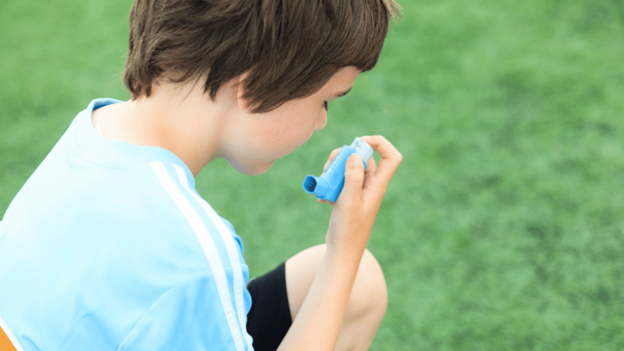
Exercise-induced asthma: keeping your young athlete safe and active.
You’re watching from the sidelines when your child suddenly slows down at soccer practice. Their breathing is heavier than usual; maybe there’s a cough or a hand pressed to their chest. Most of the time, it’s just catching their breath. But sometimes, these signs can point to exercise-induced asthma. This happens when the airways temporarily tighten during activity, making it harder to breathe and keep up in sports.
This condition affects up to 25% of young athletes (varying by sport and environment). Still, with early diagnosis and the right treatment plan, kids can stay active, enjoy sports, and even compete at elite levels.
In fact, athletes like David Beckham, Jerome Bettis, and Olympic swimmer Greg Louganis have all successfully managed exercise-induced asthma for years while excelling in their sports.
At CityMD urgent care, we help families spot asthma symptoms in kids, confirm the diagnosis, and create personalized action plans to keep young athletes breathing easier. From recognizing warning signs to offering effective asthma treatment, we make it possible for children to perform their best while staying safe on the field.
How to recognize exercise-induced asthma symptoms in kids and teens.
Exercise-induced asthma symptoms typically appear during or shortly after physical activity, but they can be tricky to spot since they often look like normal exercise fatigue.
The main difference between exercise-induced asthma and normal tiredness after sports is when the symptoms start and how strong they are. Episodes usually begin within minutes of starting exercise and can last even after your child takes a break.
Signs to look for during or after sports include:
- Wheezing or shortness of breath that doesn’t improve with a break
- A deep cough that keeps going after play stops
- Chest tightness or pressure
- Feeling more tired than expected for the activity
- Avoiding sports or asking for extra rest breaks
Symptoms typically appear within 5-20 minutes of starting exercise and can continue for 30 minutes after stopping. Cold, dry air often makes symptoms worse, which is why winter sports or air-conditioned gyms can trigger more breathing problems.
How to manage exercise-induced asthma in kids during sports and PE.
Most kids with exercise-induced asthma can stay active and enjoy sports with the right plan in place.
- Create an asthma action plan. Include which medications to use, when to use them, and what to do if symptoms appear. Share it with coaches, PE teachers, and the school nurse.
- Use preventive medication. Many children benefit from a rescue inhaler about 15-20 minutes before activity.
- Pick sports that match your child’s triggers. Swimming is often easier on the lungs because of warm, humid air. Sports with breaks, like baseball or volleyball, may be better than nonstop running in cold weather.
- Always warm up and cool down. A gradual 10-15 minute warm-up prepares the airways; a cool-down helps breathing return to normal.
- Plan for environmental triggers. Exercise indoors on high pollen days, cover the mouth and nose in cold weather, and keep your child hydrated.
When to seek emergency care for exercise-induced asthma in kids.
Most exercise-induced asthma can be managed with planning, but some situations need immediate attention.
Call 911 if your child:
- Has severe breathing difficulty that doesn't improve with rest and rescue medication
- Cannot speak in full sentences due to breathlessness
- Shows blue or gray coloring around the lips or face
- Appears confused or unusually anxious due to breathing problems
Seek urgent care at CityMD when:
- Symptoms worsen despite following the action plan
- Your child needs rescue medication more often than usual
- They're missing sports activities due to breathing problems
- You're concerned, but the symptoms aren't immediately life-threatening
At CityMD urgent care, we help families spot asthma symptoms in kids, refer for appropriate evaluation and create personalized action plans to keep young athletes breathing easier. Visit CityMD for same-day urgent care and expert treatment for exercise-induced asthma in kids.
We're conveniently located with extended hours, making it easy to get care when breathing problems arise. With proper management, most children can participate fully in sports while staying healthy and active.

We’re ready to care for you.
Visit any CityMD urgent care location in your community today for an evaluation with one of our expert providers.